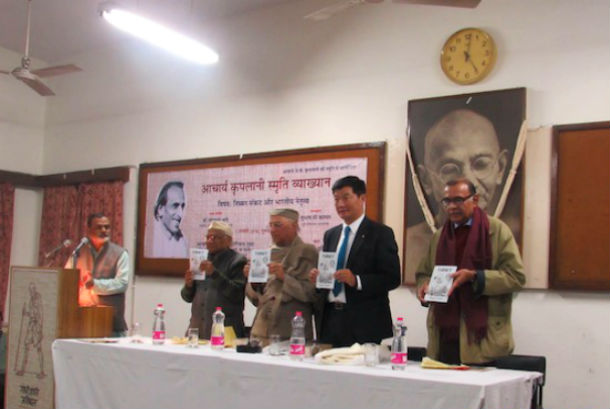 New Delhi — "The attention for Tibet around the world is quite good at the moment," Sikyong or the democratically elected political leader of Tibetan people, said while speaking in New Delhiabout the growing support and interest on the issue of Tibet.
New Delhi — "The attention for Tibet around the world is quite good at the moment," Sikyong or the democratically elected political leader of Tibetan people, said while speaking in New Delhiabout the growing support and interest on the issue of Tibet.
Dr Lobsang Sangay delivered the Acharya Kripalani Memorial Lecture at Gandhi Peace Foundation in New Delhi. Jivatram Bhagwandas Kripalani, known as Acharya Kripalani, was an Indian politician and Gandhian, noted particularly for holding the presidency of the Indian National Congress during the transfer of power from Great Britain to India in 1947.
Dr Subhash C. Kashyap, Former Parliamentary Secretary of Lok Sabha, chaired the Lecture which included speakers such as noted scholar and academician Prof Anand Kumar, and Shri Pyare Mohan Tripati, Trustee of Acharya Kripalani Memorial Trust.
In his address, Sikyong spoke about the immense support that Tibet enjoys among the general Indian public, drawing from the experiences that Sikyong has had during his days as a youth activist in Delhi, the Tibetan administration media reported.
"The amount of support that India extends towards Tibet is incomparable. It is because of the support extended by Indian leaders and scholars including Acharya Kripalani and others that the Tibet issue has stayed relevant throughout the years," Sikyong said.
"Even among the general public, solidarity towards the Tibet issue is apparent. For instance, during my days as a youth activist I have frequented the jails of Chanakyapuri. Even though, the police always arrest us during protests, they never fail to express their sympathy with the Tibet issue and treat us warmly," Sikyong added.
Speaking about the growing support and interest on the Tibet issue, Sikyong said that the attention for Tibet around the world is quite good at the moment and cited the recent all India-Tibet support group meeting held in Guwahati as an example.
"Recently, we held the All-India Tibet Support Group Meeting at Guwahati where nearly 300 Tibet supporters from across India attended. The last time I was in Guwahati, the media attention towards the Tibet issue was lukewarm. However, this time, even though I was at Guwahati for only 24 hours, the media coverage was much more widespread and pronounced," Sikyong said, adding that it was because the people of Assam and the northeast have woken up to the implications of China's dam-building spree in Tibet.
"Brahmaputra, which flows from Tibet, is the lifeline of Assam and obviously Bangladesh. The construction of dams and diversification of river waters by China have led to recession of water levels in the Brahmaputra. As a result, it will have a major implication on the livelihood of millions of people in Assam and Bangladesh. Hence, the growing interest on the Tibet issue among the people of Assam and the northeast," Sikyong said.
Speaking about geopolitical security, Sikyong said that the invasion of Tibet has resulted in a serious threat to India's borders, which were apparent in the numerous incursions by Chinese soldiers into India.
"Acharya Kripalani and a host of other Indian leaders have spoken about the Tibet issue from a long time back. Most of what they have said is now coming true. Acharya Kripalani, for instance, has said that due to the invasion of Tibet, the buffer between the two nations has been removed which could affect India adversely," Sikyong said, remarking that Acharya's apprehensions about the security threat is now turning into a reality with a military build-up along the border.
"Some Indian Security experts have told me that the infrastructure developed by China near the Indo-Tibetan border is of military standard, which means, China could transport military equipment to the border within a short span of time," Sikyong noted.
"They are now bringing a railway line to Shigatse, with plans to connect till Nepal. A network of highways, a growing number of airports, and Beijing's increasing militarisation of the plateau make China's position in Tibet unassailable. All this infrastructure development in Tibet is cemented by a rash of urbanisation to be populated by migrant Chinese," Sikyong said, expressing his concern.
Speaking about the implication of global warming on Tibet, Sikyong said that the Tibetan glaciers, which are a major source of Asia's rivers, are retreating at an alarming rate, posing a serious threat to the 1.3 billion people for whom these rivers are a source of life.
"50% of Tibet's glaciers have already melted in the last 100 years. By 2050, 50% of Tibet's present glaciers will melt, according to environment experts. It poses a serious threat of survival to a large number of people in China as well as in South Asia," Sikyong asserted.
"China has almost 20% of the world population and only 11 or 12% of fresh water which means 7 to 8%, correspondingly over 400 million Chinese, are facing scarcity of freshwater. The situation in South Asia is even more grave," Sikyong added, quoting, in the future, wars could be fought over water as opposed to the current wars over land and energy.
Sikyong concluded his address by expressing optimism about the Tibetan movement and said that that a resolution to the Tibet issue is imminent. He recalled Mahatma Gandhi's non-violent struggle against the mighty British Empire to regain India's independence and alluded that the non-violent Tibetan movement will similarly restore freedom for the Tibetan people through the Middle Way Approach.


![Tibet has a rich history as a sovereign nation until the 1950s when it was invaded by China. [Photo: File]](/images/stories/Pics-2024/March/Tibet-Nation-1940s.jpg#joomlaImage://local-images/stories/Pics-2024/March/Tibet-Nation-1940s.jpg?width=1489&height=878)















